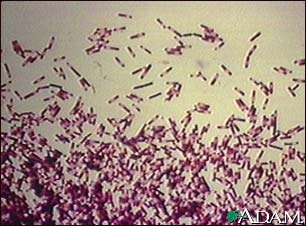The genetic analysis of Clostridium difficile, the most deadly of hospital superbugs and its close relatives is under way at the University of Nottingham; undertaken by Professor Nigel Minton and his team in the Centre for Healthcare Associated Infections (CHAI), with Dr Peter Mullany at University College, London. They have been awarded more than £1.6m by the Medical Research Council for this purpose.
Bacterium Clostridium difficile (C. diff) as they are called, are microscopic spores infiltrating hospitals, which resist most antibiotics. This infection is as fatal as MRSA and is found to kill many people. according to official reports there is 1 in 50 chance of developing C. diff.
The ClosTron ‘knock out’ system developed by Professor Nigel Minton along with his researchers with funding from the Biotechnology and Biological Sciences Research Council (BBSRC) and Morvus Technology Ltd, attacks specific genes in C. diff and other clostridial species.
Now scientists can look for new therapies to prevent and cure the bacteria once the toxins and other factors causing the disease, can be deactivated with the help of this ‘knock out’system. This is the first time that they have gone so far in their efforts to combat this deadly bacteria.
As Professor Minton says,
‘Although we have the entire genetic blueprint of C.diff, and have an inkling as to what bacterial factors might be important in disease, we have been unable to test these ideas. You never really know what a particular factor is doing until it isn’t there. You need to be able to inactivate, ‘knock-out’, the gene responsible, and then see if the bacterium can still cause disease. Until now ‘knocking out’ genes has been very difficult to do. Our breakthrough ClosTron technology now makes gene knock-out very quick and easy. Once we know what factors are important we should be able to develop methods of preventing C.diff causing disease’.
This ClosTron technology can also be used to insert genes thereby advancing the development of anti-cancer treatments. At the same time it can also work towards controlling the food borne bacterium C. botulinum. Also along with metabolic engineering, this technology will increase the effectiveness of the production of the biofuel butanol by C. acetobutylicum.
However the antibiotics used to fight C.diff are still ineffective. For this the scientists at CHAI are in the process of debilitating the bacteria which leaves the immune system to deal with the infection. This also proves to be effective in reducing the selection pressure for antibiotic resistance which takes place when traditional antibiotics are administered.
Professor Richard James, Director of CHAI plans to apply for £5m to increase the number of researchers studying this deadly infection over the next five years. The researchers will be taken from nine schools at The University of Nottingham and as Professor Richard James states the funding,
“will be used to investigate an integrated programme of action in hospitals that can reduce the incidence of infections, for new diagnostic tests to rapidly identify C. diff or MRSA and to develop novel antibiotics in order to treat these infections.”
He further states that the success of the research is finally going to be measured by how it helps improve the patients as well as the reduction in costs that it brings about to the NHS in treating infections.
source




